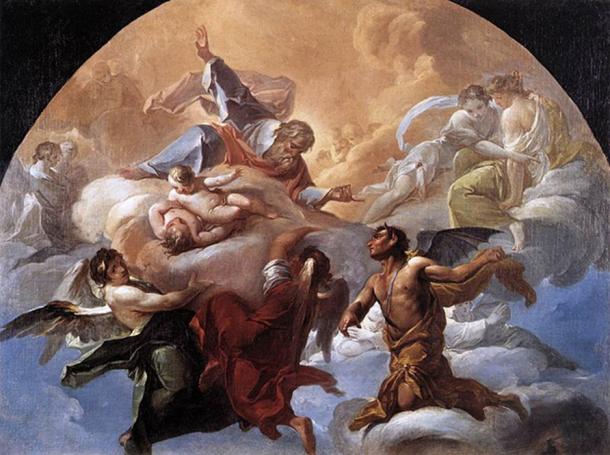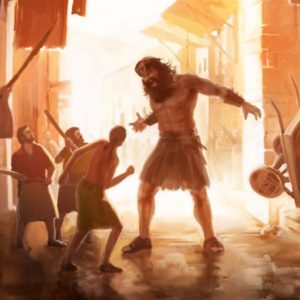The book of Job has long puzzled many Bible readers. The entire story appears to make it look as though God allows Satan to torment Job with every manner of hardship just to prove to Satan that he was wrong in saying that the only reason Job worships God is because God blessed him with a happy life. In other words, it looks as though God’s only reason for letting Satan afflict Job was to win a bet. Skeptics of The Bible argue that it is morally objectionable to let Satan do such a thing for such a petty reason.
However, perhaps we needn’t dispute with the skeptic on this point. Perhaps God let Satan do what he did to prove a point, not to Satan, but to His divine council.
Some Background
Long time readers of this blog will remember what “The divine council” is, but for newcomers, let me just go over a quick refresher. Interested readers can read the blog post “What Is The Divine Council and Is It Biblical?” and my paper “Genesis 10-11: The Tower Of Babel, The Fall Of The gods, and The Divine Council Worldview” for more information. Basically, The Divine Council are a council of divine beings created by God to make decisions about what happens in the universe and in the lives of humans in tandem with God. One of the clearest examples of this can be seen in 1 Kings 22 in which the prophet Micaiah recounts a vision God gave him, and in the vision, God asked his heavenly host what the best course of action to take would be in bringing about the demise of King Ahab. One says one thing, and another says another thing. Finally, one of the council members comes forth and says that he will be a lying spirit in the mouth of all of Ahab’s prophets, and Yahweh tells him “You will succeed. Go and do it.”. The Bible calls these beings “gods” in places like Psalm 82, but the biblical authors are clear that they are not on par with Yahweh. Deuteronomy 32:8-9 says that some of these members fell at The Babel event and were allotted to the 70 nations. These nations would worship the ex-council members as gods, and in Psalm 82, we read that these ex-council members ruled unjustly and that God would execute them for their wicked rule.
Satan; The Divine Prosecutor and The Sons of God
Let’s look at the two opening passages of Job:
Job 1: 6-12 say “Now there was a day when the sons of God came to present themselves before the LORD, and the adversary also came among them… And the LORD said to the adversary, ‘Behold, all that he has is in your hand. Only against him do not stretch out your hand.’ So the adversary went out from the presence of the LORD.”
Job 2: 1-6 say “Again there was a day when the sons of God came to present themselves before the LORD, and the adversary also came among them to present himself before the LORD… And the LORD said to the adversary, ‘Have you considered my servant Job, that there is none like him on the earth, a blameless and upright man, who fears God and turns away from evil?… And the LORD said to the adversary, ‘Behold, he is in your hand; only spare his life.”
It is evident that the two times Satan accuses Job of being faithful only because God gave him a happy life that these occur in divine council settings. The “Sons of God” are present, who are obviously divine beings elsewhere in The Bible (see Psalm 82:6, Job 38:6-7, Genesis 6:1-4). It is also noteworthy that what the NIV translates in English as simply “Satan” is actually “Ha Satan” in Hebrew. Literally, “The Satan”. Satan is The Hebrew word for “adversary” or “enemy”. Bible scholars such as Michael Heiser argue that in the divine council, this being in Job 1 and 2 had the role of a prosecuting attorney.
We can see The Accuser (ha satan) doing this in Job 1 and 2, but he shows up elsewhere doing this same task. Zechariah 2:13-3: 7 says “Be silent, all flesh, before the LORD, for he has roused himself from his holy dwelling. Then he showed me Joshua the high priest standing before the angel of the LORD, and Satan [‘the adversary’] standing at his right hand to accuse him… Now Joshua was standing before the angel, clothed with filthy garments. And the angel said to those who were standing before him, ‘Remove the filthy garments from him.’… And the angel of the LORD solemnly assured Joshua, ‘Thus says the LORD of hosts…'”
As Brian Godawa explains “Scholars point out that this vision of Zechariah is exemplary of another thread throughout the Old Testament of the covenant lawsuit. As we have seen in Job, 1 Kings, and Zechariah, there are legal procedures that the divine council engages in when deliberating judgment upon Israel or another guilty nation or king.“1
The book of Revelation tells us a bit more about Satan’s role as the accuser: “Then I heard a loud voice in heaven say: ‘Now have come the salvation and the power and the kingdom of our God, and the authority of his Messiah. For the accuser of our brothers and sisters, who accuses them before our God day and night, has been hurled down’” (Revelation 12:10).
Proving Job’s Innocence To The Divine Council
Here’s where I’m going with all of this: Given that (A) Satan is a divine prosecuting attorney, (B) that Satan is hurling accusations about Job in the presence of the divine council and God, and (C) that God feels the need to actually respond to these allegations and not ignore them, it is possible that what we have here is The Accuser (ha satan) bringing a lawsuit or legal charge about Job to Yahweh, and Yahweh needs to vindicate Job.
But why would God need to do that? He’s omniscient, right? God knows everything that Job could, would, and will do (in His natural, middle, and free knowledge). Why can’t God just tell The Accuser “I’m omniscient and you’re not, so I’m in a better position to know the validity or lack thereof of these charges, and I declare Job innocent of all charges.”?
Because although God may not care what Satan thinks, and God is in the epistemic position to know better, the divine council members are not. They are created beings and are ergo limited in knowledge and power just as Job, Satan, or any other created being is. It is quite possible that God cared about not having Job’s reputation smeared in front of His divine sons. We can imagine that some of the gods were gossiping among themselves as to whether The Accuser was right. “Maybe Job really is faithful only because of what He can get out of it. Maybe Job would turn against God if He took everything away from Him”. If so, then God would want to set the record straight to save Job’s reputation. God was like “I won’t have you thinking such things about Job. He really is genuine in His faithfulness and I will prove it to you!”
So, while the skeptic is correct in asserting that “God was trying to prove a point” in letting Satan do all of those bad things to Job, it is not the case that “God was trying to prove a point to Satan”. God wasn’t trying to “Win a bet”. He was trying to win an verdict of innocence. He was trying to clear Job’s name to the divine council.
Now, the skeptic may still balk at this and object that the amount of suffering Job endured wasn’t worth convincing some angelic beings that Job’s faith was genuine. However, the skeptic needs to remember that Job’s day is not ours. People in different cultures give different emphasis and priorities to different things. This is very nicely explained in E. Randolph Richards and Brandon J. O Brien’s book “Misreading Scripture Through Western Eyes” which I reviewed here.
The Ancient Near East was an honor/shame culture, and they placed a much much higher value on honor than we in the west due. To lose one’s honor was seen as an extreme tragedy, and people would go to great efforts to preserve their honor. Consider the Japanese, for example. Answers.com says “Honor is a very important thing in Japanese culture even more so than the Chinese. They’d rather die than surrender (the way of the samurai’s or their Bushido) and there is no way to say surrender in Japanese, it just doesn’t exist. They would rather seppuku (basically suicide) than bring shame or dishonor to their family…”2
Although the Japanese Samurai lived in a different culture than Job, it was still an honor/shame culture, and history shows us that people preferred death over dishonor. To die in battle, even at your own hands, was seen as more honorable than surrendering to the enemy or running away in cowardice.
We don’t have enough historical evidence (to my knowledge at least) to say whether Ancient Near Easterners held dishonor to the same level of abhorrence as the feudal Japanese or Chinese, but it does at least show that Job might have – if he had known what was going on – preferred to suffer to prove to the sons of God that The Accuser was wrong than to go on living in health and wealth but with his honor shattered in the devil’s hands. Perhaps had Job known, he would have told Satan “Bring it on!” Perhaps, unlike the skeptic, Job would have thanked God for letting ha satan afflict him in order to vindicate him.3
Why Didn’t God Make This Known To Job?
At this point, readers may ask why God left Job in the dark about all of this. God is not obligated to explain all of His plans to us mortals. We are to respond in faith and obedience to Him. I think this is why, when God shows up to Job and his friends in the whirlwind near the end of the book, rather than explaining Himself, God poses dozens and dozens of questions to Job about His creation — questions that Job is unable to answer. I believe that God’s point was “I am infinitely more wiser and knowledgable than you, Job. I’m much more powerful than you. The fact that I know the answers to all these questions and you don’t should show you that you should put more faith in Me than in your own understanding.” This is a lesson that all of us need to learn as we go through suffering in this life. Proverbs 3:5 says “Trust in The Lord with all your heart and lean not on your own understanding.” How dare we bring The Almighty under our condemnation when we have such limited understanding about the facts.
Conclusion
The reason God allowed The Accuser/Satan to torment Job was to prove that Satan was wrong to the members of the divine council. God would not allow his divine sons to believe evil lies about Job. God would not allow Job to be dishonored in the midst of the gods. God wasn’t trying to win a bet against Satan nor was God ignorant about whether Job was faithful (as an Open Theist might try to argue). God was proving to his heavenly host, the divine council, the gods, that Job’s faithfulness did not depend on his circumstances, and therefore The Accuser’s legal charges are null and void. In an honor/shame culture, to be dishonored was a horrible fate, and in some cultures it was seen as a fate worse than death. Perhaps in Job’s eyes, unlike in the eyes of some western 21st century God haters, God was doing Job a favor!
NOTES
1: Godawa, Brian. When Giants Were Upon the Earth: The Watchers, the Nephilim, and the Biblical Cosmic War of the Seed (p. 58). Embedded Pictures Publishing. Kindle Edition.
2: https://www.answers.com/Q/Explain_the_concepts_of_shame_and_honor_in_Japanese_culture
3: This would also explain why The Old Testament law called for those who dishonored their parents to be put to death (Exodus 21:15, 17). Dishonor may not seem to be such a big deal to our modern western culture, but that’s because, unlike the ANE, Japan, and China, our western culture de-emphasizes honor and shame. To one in an honor/shame culture, to be dishonored would be quite a severe offense.






Alpha and omega is Yahweh
Praise him
Yahshua his blood
Amen